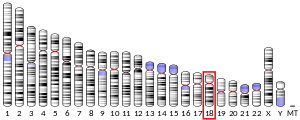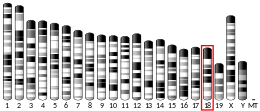Dymeclin is a protein that in humans is encoded by the DYM gene.
This gene encodes a protein which is necessary for normal skeletal development and brain function and has been first described and named in 2003. Mutations in this gene are associated with two types of recessive osteochondrodysplasias, Dyggve-Melchior-Clausen (DMC) syndrome, which involves both skeletal defects and postnatal microcephaly with intellectual deficiency, and Smith-McCort (SMC) dysplasia, which involves skeletal defects only.
References
- ^ GRCh38: Ensembl release 89: ENSG00000141627 – Ensembl, May 2017
- ^ GRCm38: Ensembl release 89: ENSMUSG00000035765 – Ensembl, May 2017
- "Human PubMed Reference:". National Center for Biotechnology Information, U.S. National Library of Medicine.
- "Mouse PubMed Reference:". National Center for Biotechnology Information, U.S. National Library of Medicine.
- ^ "Entrez Gene: DYM dymeclin".
- El Ghouzzi, V. (2003-02-01). "Mutations in a novel gene Dymeclin (FLJ20071) are responsible for Dyggve-Melchior-Clausen syndrome". Human Molecular Genetics. 12 (3). Oxford University Press (OUP): 357–364. doi:10.1093/hmg/ddg029. ISSN 1460-2083. PMID 12554689.
Further reading
- Maruyama K, Sugano S (1994). "Oligo-capping: a simple method to replace the cap structure of eukaryotic mRNAs with oligoribonucleotides". Gene. 138 (1–2): 171–4. doi:10.1016/0378-1119(94)90802-8. PMID 8125298.
- Suzuki Y, Yoshitomo-Nakagawa K, Maruyama K, et al. (1997). "Construction and characterization of a full length-enriched and a 5'-end-enriched cDNA library". Gene. 200 (1–2): 149–56. doi:10.1016/S0378-1119(97)00411-3. PMID 9373149.
- Ehtesham N, Cantor RM, King LM, et al. (2002). "Evidence that Smith-McCort dysplasia and Dyggve-Melchior-Clausen dysplasia are allelic disorders that result from mutations in a gene on chromosome 18q12". Am. J. Hum. Genet. 71 (4): 947–51. doi:10.1086/342669. PMC 378548. PMID 12161821.
- Thauvin-Robinet C, El Ghouzzi V, Chemaitilly W, et al. (2002). "Homozygosity mapping of a Dyggve-Melchior-Clausen syndrome gene to chromosome 18q21.1". J. Med. Genet. 39 (10): 714–7. doi:10.1136/jmg.39.10.714. PMC 1734996. PMID 12362026.
- Strausberg RL, Feingold EA, Grouse LH, et al. (2003). "Generation and initial analysis of more than 15,000 full-length human and mouse cDNA sequences". Proc. Natl. Acad. Sci. U.S.A. 99 (26): 16899–903. Bibcode:2002PNAS...9916899M. doi:10.1073/pnas.242603899. PMC 139241. PMID 12477932.
- Cohn DH, Ehtesham N, Krakow D, et al. (2003). "Mental retardation and abnormal skeletal development (Dyggve-Melchior-Clausen dysplasia) due to mutations in a novel, evolutionarily conserved gene". Am. J. Hum. Genet. 72 (2): 419–28. doi:10.1086/346176. PMC 420018. PMID 12491225.
- El Ghouzzi V, Dagoneau N, Kinning E, et al. (2003). "Mutations in a novel gene Dymeclin (FLJ20071) are responsible for Dyggve-Melchior-Clausen syndrome". Hum. Mol. Genet. 12 (3): 357–64. doi:10.1093/hmg/ddg029. PMID 12554689.
- Ota T, Suzuki Y, Nishikawa T, et al. (2004). "Complete sequencing and characterization of 21,243 full-length human cDNAs". Nat. Genet. 36 (1): 40–5. doi:10.1038/ng1285. PMID 14702039.
- Gerhard DS, Wagner L, Feingold EA, et al. (2004). "The status, quality, and expansion of the NIH full-length cDNA project: the Mammalian Gene Collection (MGC)". Genome Res. 14 (10B): 2121–7. doi:10.1101/gr.2596504. PMC 528928. PMID 15489334.
- Clark TA, Schweitzer AC, Chen TX, et al. (2007). "Discovery of tissue-specific exons using comprehensive human exon microarrays". Genome Biol. 8 (4): R64. doi:10.1186/gb-2007-8-4-r64. PMC 1896007. PMID 17456239.
This article on a gene on human chromosome 18 is a stub. You can help Misplaced Pages by expanding it. |



